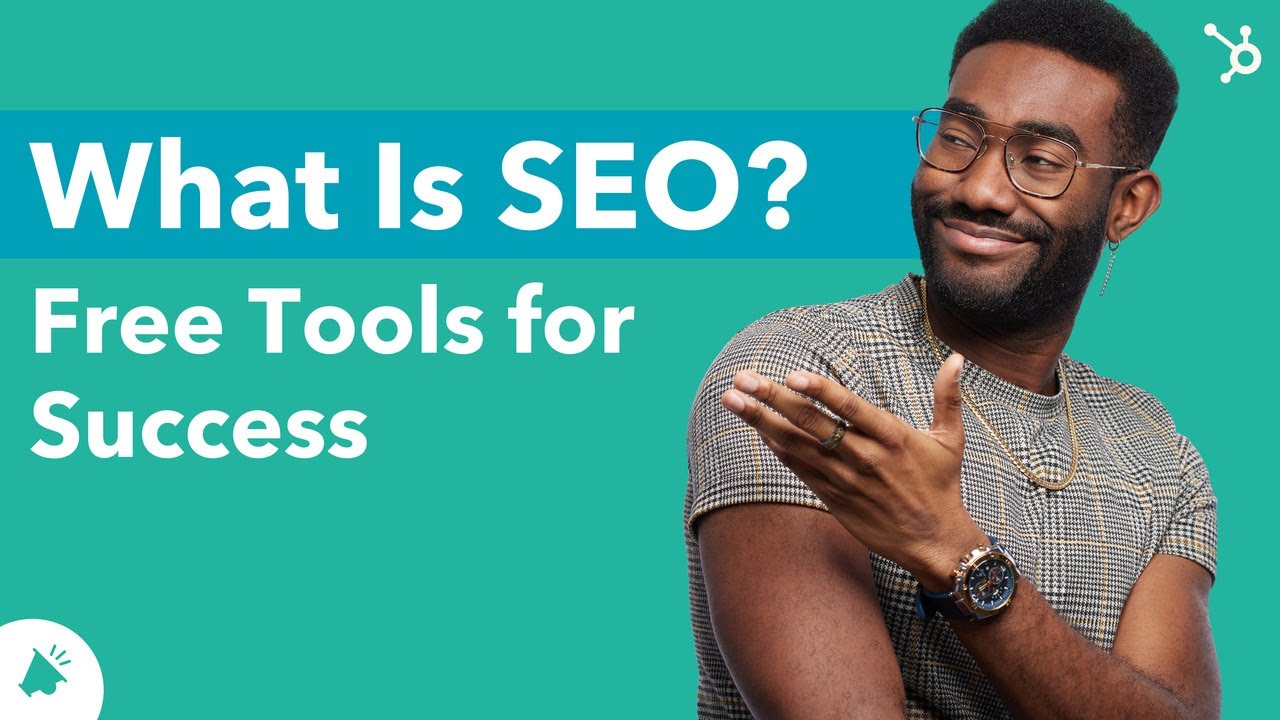What is SEO? Here’s How To Rank In 2023
– All right, newsflash for
everybody that didn't know. If you're looking for
the most effective way to build your online business, nothing beats search
engine optimization or SEO. That's because 68% of online experiences begin with a search engine and 61% of B2B marketers say
that SEO and organic traffic generate more leads than any
other marketing initiative. What's up, It's Jamal from HubSpot and welcome back to the channel.
In this video, I'm gonna
explain what SEO is and why it's crucial to
building an online business. I'm also gonna teach you the
best ways to rank in 2022 and give you the free tools
you need to get started. Be sure to subscribe to the channel and ring that notification bell. If your business lives
online, you already know that every day is a battle
against the competition to occupy the top spots on search results because occupying the top spots means more organic traffic
coming to your site every hour, every minute, even every second, maybe even every nanosecond, a Planck length worth of a second. Look that up if you
don't know what that is. SEO is an ongoing process
that helps your website rank higher in search results, making your brand, product, or service more visible to people who are looking for the
solutions you provide.
I say ongoing because the
algorithm that determines where your site ranks on the
search results page or SERP is always being updated, and you can bet your bottom dollar and not your bottom line,
but your bottom dollar that your competition
is constantly working to improve their SEO and top your business in search results. That means SEO is a race that never ends. And while that may sound tiring, it also means that every
day is another chance to improve your own ranking
and increase your leads. So, where do you start? Well, to help you get a
handle on your onsite SEO, HubSpot offers a free SEO starter pack that you can download from
the link in the description. It includes a 30-day planner to help you move through your
SEO optimization step by step. It also has content planning
and keyword research templates that help you stay organized, plus a list of the top 31 myths about false and outdated SEO
you're likely to run into.
That's just a little something we, you know, sprinkled on top,
just little, little salt bae, you know why? 'Cause we care about you and
we wanna see you succeed. Now that you've downloaded the tools, let me take a few minutes
to explain how SEO works. SEO can basically be
divided into two categories, on-page SEO and off-page SEO, each with their own methods
and metrics for success. On-page SEO means everything
you can do on your own website to make it more attractive to the algorithms that
determine search page ranking. This can be divided into
two categories itself, content and code. Content means every word on your site and code is the way that the
site is built on the backend.
Let's start with content. At the root of all the
content is your keywords. Keywords are the fundamental
building blocks of SEO because they distill
what people are searching and match it with what
your website offers. Success in SEO is often
gauged by how your site ranks for keywords relevant to your site. And I'm sure you're thinking yourself, "Wow, fancy words, Jamal,
I'd love an example." Good, I'm glad we're on the same page 'cause here's an example for you. When America's Best eyeglasses wanted to increase its
organic search traffic, it started by conducting
extensive research into what eyeglass-related keywords people were typing into search engines. By incorporating those
keywords into their website, America's Best was able to achieve first page ranking results for
over 140 targeted keywords, resulting in a 41% increase in traffic. I don't know about you, but if I was ranking
for 140 of anything, uh, nah, I don't know,
that'd be nice, you know? The challenge in 2022 is that
nearly every keyword possible has dozens if not hundreds or thousands of other websites with those keywords.
So, just having those words
on your website isn't enough. Fortunately, search engines have gotten a lot more
robust and sophisticated in their ability to analyze the context in which keywords live
inside of a site's content. The better the content in
which the keywords live, well, the higher the search ranking. Google determines which content is better using what it calls the EAT principle, which stands for expertise,
authoritativeness, and trustworthiness. To determine your site's EAT ranking, Google compares it to
millions of other sites and rates it by hundreds of factors. The good news is, you don't have to consider
these specific factors when creating the content on your site. Google rewards sites that reward users with a quality experience. So the things you would already do to make your site rewarding for users is what improves your SEO.

This can mean informative blog posts, easy to understand landing pages, or useful user tools and
other quality content. One thing Google is looking for
in 2022 is long form content that provides users with
plenty of useful expertise and keeps them reading. Google also looks for
trustworthiness and content that links to other authoritative sites to prove that you're just
not making things up, which if you knew me in college, I was certainly liable to
do, you know what I'm saying? You shouldn't have trusted a word that came outta my mouth, frankly. And you could increase your
own authoritativeness rating by creating content other sites link to, but I'll talk more about
that in a few moments. – I can find this client info. – Have you heard of HubSpot? HubSpot is a CRM platform so it shares its data
across every application. Every team can stay aligned, no out sync spreadsheets
or doing databases. – [Narrator] HubSpot, grow better. (funky music) – The other component to onsite
SEO is what we call code. Code is the literal computer language that makes up your website
and how it's all put together because the crawlers that
constantly analyze your site and send that info back
to the search engines aren't looking at the
content you and I see.
It's exploring the code in the backend to find out what's there. So the structure of your site
can really make a difference. And great content on a poorly built site will generally fail to
rank well in search. Optimizing your code for
SEO is way more complicated than I can get into here. That's why most businesses in 2022 choose to use a reputable website builder that takes care of all the
backend specifications. Fortunately for you, and there's lots to be fortunate for here, HubSpot's CMS hub offers
a complete website builder that lets you create a modular site that looks great on the front-end and provides all of the
technical specs for site security and SEO optimization on the backend. Nice. If you wanna know if your
current site makes the grade, check out HubSpot's free website grader, which analyzes your site on key
indicators like performance, SEO, security, and mobile optimization. All these factors are important, but mobile is especially a major concern. In fact, Google has been
using mobile-first indexing since 2019.
And with mobile search making up more than 60% of
all searches and growing, you can be sure that
its importance to Google will keep increasing at 2022 and beyond. So now you should understand on-page SEO is critical to search success. But as I said, it's only half the story and I'm not a half storyteller. So, the other half is called offsite SEO and it includes all the activity
that happens on other sites to make your site more authoritative in the eyes of the search engines. Remember when I mentioned
other sites linking to yours a few minutes ago? Those, unsurprisingly,
are called backlinks and they're the final ingredient
to a strong SEO strategy.
From the very beginning, Google used backlinks to help
determine which sites to rank in its search results. As the internet has grown
exponentially bigger and more complex so has Google's metrics
for evaluating backlinks. They now include a vast algorithm that not only counts the
number of links to your site, but the quality of the
site's linking to your site. It's almost like, there's like a two-tier
system there going on, you know what I'm saying? And the quality sites
linking to those sites that link to your site and on and on the worldwide
web of links goes. And the stronger each
strand leading to your site, the stronger your own
site will rank for SEO. So, how can you influence
the endless web of links that end up connecting to your site? Well, much like onsite SEO, strategies for optimizing
offsite SEO are really complex, but if you wanna learn
more about backlinks, as well as social media SEO, and some of the special
tools Google offers to help local businesses
stand out in regional search, HubSpot has a whole blog
post about offsite SEO to get you started.
You can find the link to that
in the description below. You can also sign up for HubSpot Academy's free online SEO certification course or stick around on the channel and watch our video about how
one website, glassdoor.com used backlinks to become
one of the top career sites in the world. Now, if you'll excuse me, I'm gonna go make myself
a top search result for every single search on Google. You're gonna see me even
if you don't want to. You're welcome. I'll see you next time. Hala. I feel like the bloopers over time have just become me making noises. And you know what? I hope that's okay. I hope that's truly all
right with everyone..



